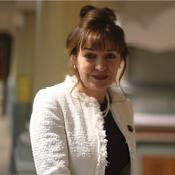
By taking the well-established technique of mass spectrometry and adapting it to study biological systems in their natural environment, Carol Robinson has opened up vast new frontiers in biology and medicine. Her unorthodox creativity and uncompromising determination have also encouraged, and set an example for, current and future generations of scientists, particularly women in science.
For more than a century, mass spectrometry has been an important analytical technique that separates and measures the molecular components in a chemical sample. Carol Robinson is one of the early visionary scientists who realized that this same technique could be adapted to study a range of biomolecules to yield invaluable information on their structure, function, and interactions. Her subsequent career has been devoted to developing and refining mass spectrometry methods to investigate proteins and their complexes. Today, Carol Robinson’s name is synonymous with research into mass spectrometry of proteins and their complexes and her work has wide-reaching application in fields from protein structure and function to drug design and discovery.
Robinson's path to becoming a world-class scientist began somewhat unconventionally. Growing up in England and fascinated at an early age by all sorts of living creatures from wildflowers to stick insects, she did not proceed directly to university, instead leaving school at age 16 to take a laboratory technician position at the pharmaceutical giant Pfizer. There, she discovered a passion and a distinct talent for hands-on laboratory work, especially mass spectrometry, the technique that would eventually dominate her career. Her supervisor noticed her scientific ability and encouraged her to return to studying. Still working at Pfizer and honing her laboratory skills, she studied chemistry part-time, then moved on to graduate school, ultimately earning her doctorate at the University of Cambridge. After stepping back from academia for eight years to raise her three children, she resumed her scientific career as a postdoctoral researcher, and subsequently as a Royal Society research fellow, at the University of Oxford.
Robinson’s early work centered on using mass spectrometry to investigate protein folding. Her initial experiments, however, attracted some controversy: it was widely thought that proteins would invert in the absence of water and she therefore had to work out how to maintain proteins intact in their folded state, during the transition from solution to vacuum in the mass spectrometer. She worked on developing mass spectrometers designed to preserve and analyze macromolecular complexes, a challenging task since the weak interactions among such biomolecules are readily disrupted by the process of moving them out of their natural cellular environment into a gas phase. Later, using ion mobility mass spectrometry she showed that the overall topology of protein complexes could be preserved, overcoming reservations that existed in the field and adding a new dimension to the study of protein complexes. At that time, Robinson's research led to the refinement and expansion of native mass spectrometry, which today has become an indispensable part of the toolkit of structural biology.
Most recently, Robinson has extended the capabilities of native mass spectrometry to study proteins and protein complexes that are normally embedded in the cell membrane, an additional challenge since physical interactions with the membrane significantly influence their structure and function. First in solutions of detergent, she and her collaborators developed a means of extracting membrane protein complexes directly from the cell membrane, protecting them effectively in giant soap bubbles before effecting their release into the mass spectrometer, another achievement previously thought impossible. Since about 70% of targets for drug therapies involve membrane-embedded proteins, this accomplishment promises enormous potential for pharmaceutical innovation. Robinson's spin-off company, OMass Technologies Ltd (now OMass Therapeutics), was formed in 2016 to help bring these techniques into broader use by pharmaceutical and biotechnology companies.
While Robinson was pushing the boundaries of native mass spectrometry, she was likewise challenging societal assumptions and limitations in a far larger arena. In 2001, she became the first female professor of chemistry at the University of Cambridge, and eight years later, the first female professor of chemistry at the University of Oxford, thus breaking the glass ceiling at two institutional pillars of the scientific establishment. She has also supervised and mentored more than 100 post-graduate students, postdoctoral researchers, and early career fellows, among them many scientists with young families and female scientists, thus serving as a stellar role model for all young scientists embarking on their careers. In 2013, in recognition of her exceptional achievements, Robinson was appointed Dame Commander of the Order of the British Empire.
Carol Robinson's success as a woman in a traditionally male-dominated field is a testament to her determination, her unorthodox and daring approaches to seemingly unsolvable problems, and her ability to think beyond conventional, long-accepted ideas. Her scientific and technical innovations have transformed a long-established instrument of scientific research into an even more important and versatile tool in ways that will open up new horizons of discovery for decades to come.

